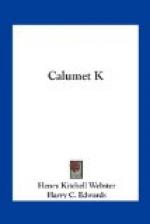The man shook his head. “What if it got away from you?”
“That’s happened,” said Bannon. “I’ve seen a leg most as big as this smash through two decks. Thought it was going right on through the bottom of the boat. But that wasn’t a leg that MacBride had hung up. This one won’t fall.”
Bannon answered one or two more questions rather at random, then suddenly came back to earth. “What are you doing here, anyway?” he demanded. “Seems to me this is a pretty easy way to earn thirty cents an hour.”
“I—I was just going to see if there wasn’t something I could do,” the man answered, a good deal embarrassed. Then before Bannon could do more than echo, “Something to do?” added: “I don’t get my time check till midnight. I ain’t on this shift. I just come around to see how things was going. We’re going to see you through, Mr. Bannon.”
Bannon never had a finer tribute than that, not even what young Page said when the race was over; and it could not have come at a moment when he needed it more. He did not think much in set terms about what it meant, but when the man had gone and he had turned back to the window, he took a long breath of the night air and he saw what lay beneath his eyes. He saw the line of ships in the river; down nearer the lake another of Page’s elevators was drinking up the red wheat out of the hold of a snub-nosed barge; across the river, in the dark, they were backing another string of wheat-laden cars over the Belt Line switches. As he looked out and listened, his imagination took fire again, as it had taken fire that day in the waiting-room at Blake City, when he had learned that the little, one-track G.&M. was trying to hinder the torrent of the Northern wheat.
Well, the wheat had come down. It had beaten a blizzard, it had churned and wedged and crushed its way through floating ice and in the trough of mauling seas; belated passenger trains had waited on lonely sidings while it thundered by, and big rotary ploughs had bitten a way for it across the drifted prairies. Now it was here, and Charlie Bannon was keeping it waiting.
He stood there, looking, only a moment; then before the carpenter’s footsteps were well out of hearing, he followed him down the stairway to the belt gallery. Before he had passed half its length you could have seen the difference. In the next two hours every man on the elevator saw him, learned a quicker way to splice a rope or align a shaft, and heard, before the boss went away, some word of commendation that set his hands to working the faster, and made the work seem easy. The work had gone on without interruption for weeks, and never slowly, but there were times when it went with a lilt and a laugh; when laborers heaved at a hoisting tackle with a Yo-ho, like privateersmen who have just sighted a sail; when, with all they could do, results came too slowly, and the hours flew too fast. And so it was that Christmas night; Charlie Bannon was back on the job.




